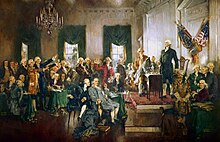Gerald Horne
Appearance


Gerald Horne (b. 1949) is an African-American marxist and historian who currently holds the John J. and Rebecca Moores Chair of History and African American Studies at the University of Houston.
Quotes
[edit]The Counter-Revolution of 1776 (2014)
[edit]- The Counter-Revolution of 1776: Slave Resistance and the Origins of the United States of America (New York University Press: 2014)
- To the extent that 1776 led to the resultant U.S., which came to captain the African Slave Trade—as London moved in an opposing direction toward a revolutionary abolition of this form of property—the much-celebrated revolt of the North American settlers can fairly be said to have eventuated as a counter-revolution of slavery.
- p. x
- On 22 June 1772 in a London courtroom ... the presiding magistrate, Lord Mansfield, had just made a ruling that suggested that slavery, the blight that had ensnared so many, would no longer obtain, at least not in England. A few nights later, a boisterous group of Africans, numbering in the hundreds, gathered for a festive celebration. ... Others were not so elated, particularly in Virginia, where the former “property” in question in this case had been residing. “Is it in the Power of Parliament to make such a Law? Can any human law abrogate the divine? The Law[s] of Nature are the Laws of God,” wrote one querulously questioning writer. Indicating that this was not a sectional response, a correspondent in Manhattan near the same time assured that this ostensibly anti-slavery ruling “will occasion a greater ferment in America (particularly in the islands) than the Stamp Act itself,” a reference to another London edict that was then stirring controversy in the colonies. The radical South Carolinian William Drayton—whose colony barely contained an unruly African majority—was apoplectic about this London decision, asserting that it would “complete the ruin of many American provinces.”
- p. 1
- This is a book about the role of slavery and the slave trade in the events leading up to 4 July 1776 in igniting the rebellion that led to the founding of the United States of America. ... It is a story that does not see the founding of the U.S.A. as inevitable—or even a positive development: for Africans (or indigenes) most particularly.
- p. 3
- Ironically, the founders of the republic have been hailed and lionized by left, right, and center for—in effect—creating the first apartheid state.
- p. 4
- Even when one posits this economic conflict as overriding all others in sparking revolt, the larger point was that it was slavery that was driving these fortunes, particularly in the North American colonies.
- p. 4

